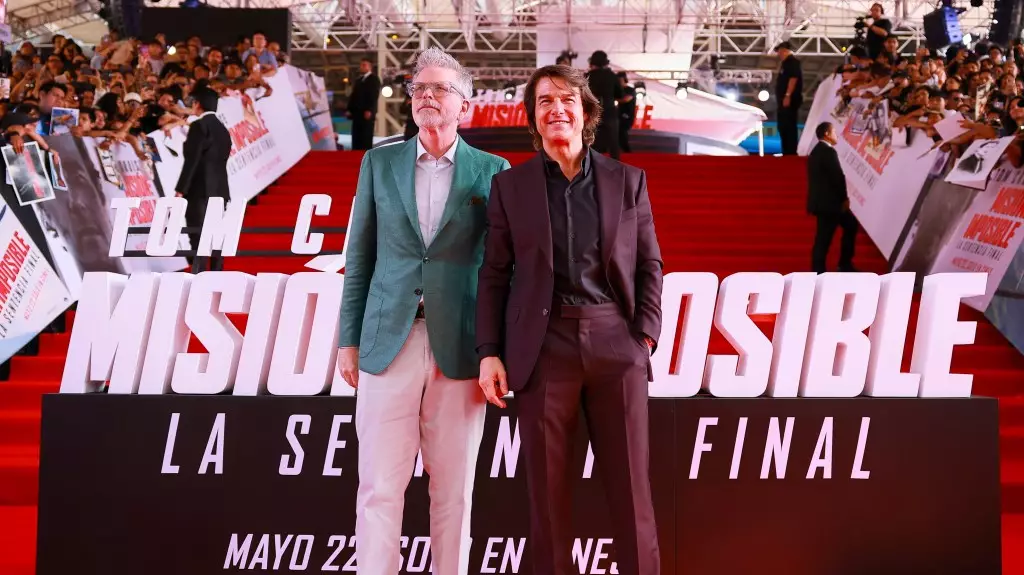The film industry, with its glitzy facades and high-stakes drama, often projects an image of seamless creativity and unfathomable potential. However, behind this veneer lies a complex tapestry of collaboration, ego, and the underlying pressure to produce commercially viable masterpieces. The announced future projects between Tom Cruise and director Christopher McQuarrie illustrate this phenomenon vividly. The duo is poised to bring lightning to the screen yet again, delicately balancing artistic ambition with commercial pressure in their upcoming sequels, including a much-anticipated follow-up to “Top Gun: Maverick.”
While many are undoubtedly excited about these sequels, one must ponder whether we are witnessing genuine cinematic evolution or merely a recycling of old formulas packaged with modern technology. McQuarrie’s comments about storytelling and emotional depth being paramount stand in stark contrast to Hollywood’s relentless drive for box office success. It raises the critical question: Is Hollywood cultivating true artistry, or are we continually lapping up the same nostalgic tropes?
Stagnation of Originality
The film industry has become notorious for its fixation on “proven” franchises instead of nurturing original stories. McQuarrie’s assertion that cracking the story for the “Top Gun” sequel was “not hard” is a double-edged sword. On one hand, it indicates that creative collaboration can flow naturally. On the other, it highlights a troubling aspect of contemporary filmmaking: are stories being made for the sake of art or merely to meet the relentless demands of the marketplace?
Hollywood’s transformation into a formulaic enterprise, favoring sequels, remakes, and spin-offs, suggests an environment where originality is suppressed in favor of nostalgia and bankable titles. McQuarrie’s casual dismissal of the difficulty involved in crafting new narratives serves as a reminder that our cinematic experiences are often forgettable retreads. Instead of pushing boundaries, the industry plays it safe, leaving audiences starved for innovative storytelling.
The Emotional Facade
The emotional resonance that McQuarrie underscores as essential for the success of their films sparks another area of contemplation. Emotion can indeed elevate cinema, allowing viewers to connect with characters and stories on a deeper level. However, when such emotional appeals are crafted within a largely derivative framework, do they hold the same power?
McQuarrie’s analysis of emotion transcending action raises a valid point yet is dangerously simplistic when applied to blockbuster structures, where action spectacles often overshadow nuanced storytelling. His recognition that the heart of their films lies in genuine emotional experiences prompts a critical examination of whether the industry’s focus on visual grandeur comes at the expense of thematic and narrative depth. What does it say about the current state of storytelling when sheer spectacle is often prioritized over genuine emotion?
A Mixed Bag of Ideas
Interestingly, McQuarrie’s musings about potential spin-offs—the Tropic Thunder exploration and sequels to both “Days of Thunder” and “Top Gun”—point to a wide range of creative possibilities. Yet, one cannot help but feel underwhelmed by the echoes of tradition in their collaborative projects. While these ideas may spawn laughs or thrills, they also present an alarming disparity: are new roads being paved, or are these simply offshoots of well-traveled paths?
As McQuarrie himself admits to engaging in “brainstorming stage” activities with Cruise, it leads to speculation about his commitment to genuinely explore uncharted territory. The acknowledgment that ideas spring from impromptu creative sessions surrounding filming may be a testament to a productive partnership, yet it ironically reinforces a structure based on cyclical thinking rather than revolutionary creativity.
Final Reckoning for Creativity?
In a world increasingly fixated on data-driven results, bigger budgets, and larger-than-life spectacles, the true casualty remains the creative soul of the film industry. McQuarrie’s reflections on the future highlight the fundamental challenge artists face in an unforgiving landscape. The excellent rapport between himself and Cruise, while promising on many levels, leads one to wonder: can these renowned figures transcend the confines of familiar tropes and provide audiences with genuinely groundbreaking narratives, or will they continue to play it safe within the gilded cage of franchise filmmaking? The answer remains elusive, casting a shadow over the future of storytelling in cinema.

Leave a Reply